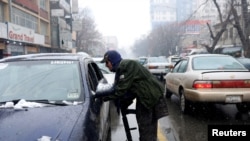Taliban authorities in Afghanistan on Saturday arrested an outspoken critic of the government, drawing strong calls for his immediate release from civil society activists.
Family members said Faizullah Jalal, a professor of law and political science, was seized by security forces from his residence in the Afghan capital, Kabul.
“As I confirm this disturbing news, I ask for the immediate release of my father, Professor Faizuallah Jalal,” tweeted Hasina Jalal, the daughter of the detained professor.
In a statement late Saturday, Taliban spokesman Zabihullah Mujahid confirmed the arrest of Jalal, accusing him of inciting people to violence against the government through his social media posts.
Afghan television channels quoted a security source as confirming Jalal was being interrogated by the Taliban intelligence agency for leveling allegations against government departments.
“[The] Taliban never have tolerated criticism or free speech. He should be released immediately,” Patricia Gossman, the associate Asia director for Human Rights Watch, wrote on Twitter.
“Why & based on what legal ground? Arbitrary arrests for expressing one's views/analysis is counterproductive & a step in the wrong direction ... in any society,” Omar Samad, former Afghan diplomat and senior fellow at Washington’s Atlantic Council asked in his tweeted reaction.
“Amnesty International condemns the arrest of Professor Faizullah Jalal, Kabul university lecturer, for exercising his freedom of expression and criticizing the Taliban on a TV show. We call on the Taliban authorities to immediately and unconditionally release him,” tweeted the global rights defender.
Rights curtailed
Critics say the Islamic group’s return to power in Afghanistan last August has resulted in increasingly curtailed freedoms of all citizens, particularly those of women and girls.
Except for those working in a few sectors, most women have been instructed to stay at home until laws and procedures related to women are put in place — more than four months after the Taliban seized control of the country. Millions of girls above grade six across many Afghan provinces are unable to attend school.
The Taliban's ministry for Islamic guidance has instructed taxi drivers to carry only those female passengers who wear a headscarf or Islamic hijab and are accompanied by a male relative if they travel more than 72 kilometers.
The Ministry for the Promotion of Virtue and Prevention of Vice, which enforces the Taliban’s interpretation of Islam, has banned Afghan women from driving and has ordered local TV channels to stop showing entertainment programs featuring actresses. Women television news anchors are required to wear hijabs while on the air.
This week, the ministry spokesman confirmed they had placed posters on cafes and shops around Kabul instructing women to wear hijabs.
“If someone does not follow it, it does not mean she will be punished or beaten, it's just encouragement for Muslim women to follow Sharia law," Sadeq Akif Muhajir told Agence France-Presse Friday.
The United States and allied nations withdrew their remaining troops from Afghanistan on August 30, and the Taliban have since consolidated their control of the country. The international community has refused to recognize the new Kabul government until the Taliban ensure respect for the human rights of all Afghans and allow women to fully participate in public life.
Washington has frozen billions of dollars in Afghanistan’s foreign cash reserves since the Taliban takeover, while most foreign financial assistance has been suspended, bringing the economy of the aid-dependent country to the brink of collapse.
The punitive measures have increased humanitarian needs in the South Asian nation to unprecedented levels amid United Nations warnings that estimated 24 million Afghans will need relief assistance this year, with many likely to be acutely food insecure by March. The humanitarian crisis stems from years of war, poverty and a prolonged drought.




